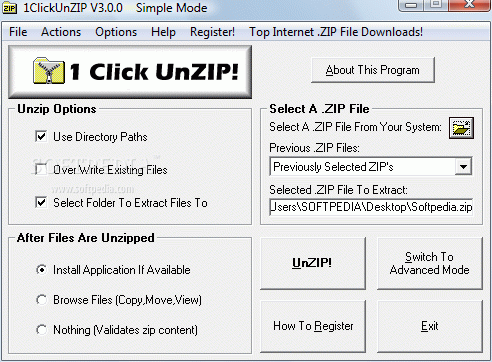Archiving tools help keep files together and prevent malicious content from infiltrating. Windows already provides default means to create, and extract basic ZIP archives, but there are also faster alternatives. For instance, 1 Click Unzip! Comes with basic and advanced tools to extract files from Zip archives in no time at all.
The setup process is done before you realize, letting you take the application for a spin afterwards. You start off in the basic mode, which provides access to extraction operations in a compact, clean window. Sadly, there’s no context menu integration for faster access, and file association needs to be manually performed.
Unfortunately the application doesn’t make it that easy to extract files from Zip archives. Not necessarily that you go through great lengths, but the time it takes to load the archive with the browse dialog, set output path, and unzip becomes rather frustrating, being way longer than conventional means.
Unlike the default Windows extraction option, you can choose to have applications automatically installed after extraction. However, the installer file needs to be under forms like Setup.exe or Install.exe to be detected. On the other hand, you can simply opt to have the destination folder opened instead.
The advanced mode doesn’t offer a lot more. On the one hand, there’s a preview panel which lets you analyze archive content, but with no file operations available. On the other hand, all steps are directly shown, including the destination field, which in the basic mode comes in the form of a prompt right before extraction is initiated.
Last but not least, the application can only handle extraction operations. This has a considerable impact on overall practicality, considering you need to use external tools if you want to create Zip archives yourself.
To sum it up, 1 Click Unzip! doesn’t quite live to expectations, mostly because of the time it takes to extract content even from incredibly small archives. With no context menu integration, or automatic file association, it’s a lot more reliable to use Windows default methods of handling Zip archives.

cristian
Tack för 1 Click Unzip! lapp
Reply
Christian
спасибі за патч для 1 Click Unzip!
Reply